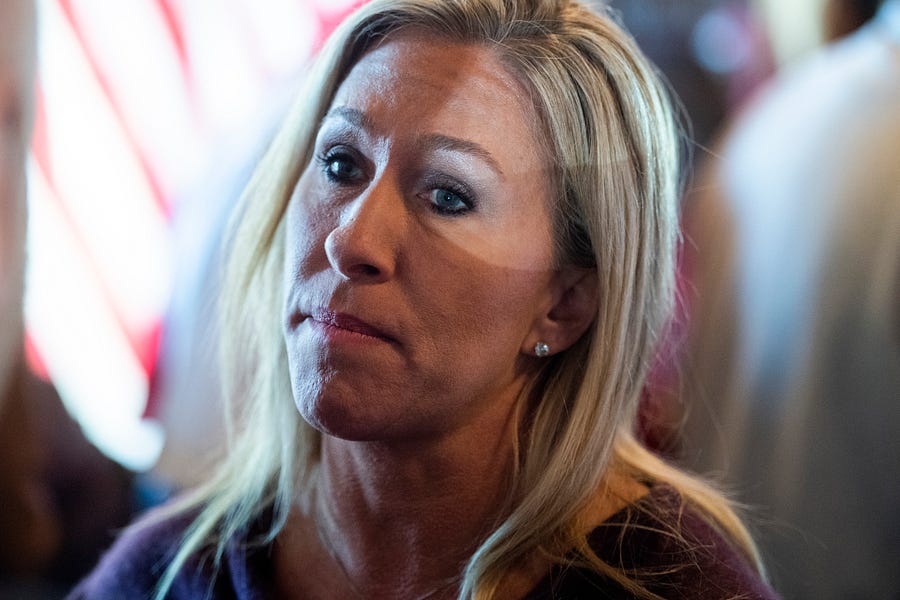Earlier today, my good friend Yascha Mounk, who is one of the most thoughtful people I know, got rather vigorously attacked for this tweet:
The dunks came all too easy. Even though Yascha clearly stated that he didn’t want to see cancelers themselves “canceled,” the response was all too predictable. As one Twitter respondent said (with characteristic Twitter snark): “LOL. Cancellations for thee, but not for me.”
But let’s take a step back for a minute and discuss the way in which the debate over cancel culture has devolved. On the one hand, there are those who deny that “cancel culture” either exists as a meaningful concept or represents any meaningful threat to America’s culture of free speech.
On the other hand, truly abusive and bad faith actors are now using widespread conservative opposition to cancel culture as a shield against suffering any meaningful consequences for their own terrible misconduct.
For example, feast your eyes on this cover image in the New York Post, one of the nation’s most-read newspapers:

In the column that followed, this is how Missouri Senator Josh Hawley described his alleged plight after he challenged the 2020 presidential election results without any lawful foundation and raised a clenched-fist salute to the very crowd that would soon storm the Capitol:
On behalf of the voters of my state, I raised a challenge to the presidential electors from Pennsylvania after that state conducted the election in violation of the state constitution. Maybe you agree with me. Maybe you don’t. But whatever your view, corporate America’s rush to cancel those it dislikes should trouble you.
In my case, it started with leftist politicians demanding I resign from office for representing the views of my constituents and leading a democratic debate on the floor of the Senate.
Taking that cue, a corporate publishing house then canceled a book it had asked me to write. Ironically enough, the book is about political censorship by the most powerful corporations in America. (And will be published by an independent publishing house.) Now corporate America is canceling my political events, because two parties are apparently one too many for their taste.
Whatever you want to say about Hawley, he’s not muzzled. He’s not canceled. He’s one of the most powerful men in the United States, a person with instant access to newspaper op-ed spaces, immediate access to new publishers, and a near-constant presence on Fox News, the nation’s most-watched cable news channel.
In fact, his continued lack of meaningful consequences in the Senate and his continued prominence in conservative media demonstrate how both institutions are broken. It’s not that the conservative media establishment is immune to cancel culture (in fact, right-wing cancel culture is alive and well). It’s that participating in a dangerous and frivolous effort to overturn a presidential election is seen as less problematic in many conservative circles than opposing Donald Trump.
Again, how broken is the discussion? Observe Marjorie Taylor Greene wrap herself in the cancel culture flag:
I don’t want to dive too deep into the MTG rabbit hole, but as Jonah details in a powerful Los Angeles Times column today, Greene has supported some “wicked stuff,” including theories that Hillary Clinton brutally murdered a young girl and that the 2018 Parkland school shooting was a “false flag.” And that’s the tip of the iceberg of her derangement.
(If you think no one is really buying Greene’s cancel culture schtick, I’d urge you to watch Tucker Carlson’s defense. He actually says, “But CNN says she has bad opinions. Therefore, she’s the greatest threat we face … Now if you’re skeptical about any of this, our advice is keep it to yourself. Because free inquiry is dead, unauthorized questions are hate speech.”)
So if the GOP takes action against Greene, would that make her a victim of cancel culture? Would it put her in the same position as San Diego utility worker Emmanuel Cafferty? Cafferty flashed an “Ok” sign at an oddly irate driver, and this is what happened next:
Two hours later, Cafferty got a call from his supervisor, who told him that somebody had seen Cafferty making a white-supremacist hand gesture, and had posted photographic evidence on Twitter. (Likely unbeknownst to most Americans, the alt-right has appropriated a version of the “okay” symbol for their own purposes because it looks like the initials for “white power”; this is the symbol the man accused Cafferty of making when his hand was dangling out of his truck.) Dozens of people were now calling the company to demand Cafferty’s dismissal.
By the end of the call, Cafferty had been suspended without pay. By the end of the day, his colleagues had come by his house to pick up the company truck. By the following Monday, he was out of a job.
Does a hotel canceling a Josh Hawley fundraiser make him comparable to progressive data analyst David Shor, who lost his job because of this tweet?
Do Hawley and Greene stand in the shoes of Majdi Wadi, an immigrant from Palestine who started a successful catering company?
But Wadi’s American dream came crashing down to Earth on June 4, when his 24-year-old daughter admitted to him that she had written a series of deeply racist and anti-Semitic posts on Twitter and Instagram starting when she was 14 years old until she was 18. An activist had drawn public attention to these posts after stumbling across an especially noxious one. That same day, Wadi did what he describes as “one of the toughest things I’ve ever had to do in my life”: he fired his daughter from her position as the company’s catering director.
Neither Wadi’s long standing in the community nor his quick action to sever his company’s ties with his daughter are likely to salvage his company. Nearly all of his business partners have canceled their contracts. His landlord terminated the bakery’s lease.
I take each of the examples above from my friend Yascha’s June 27, 2020 Atlantic essay called “Stop Firing the Innocent” that details what true cancel culture is doing to American racial discourse.
Next week I’ll be privileged to participate in an important online discussion hosted by Baylor University. It’s called “Free Speech on Campus: Is It in Danger?” (register here if you’d like to attend), and I’m going to make three key points related to the incidents and arguments above.
First, as a legal matter, free speech enjoys more protection from government censorship than at any time in American history (this is true—the First Amendment has a tremendous winning record at the Supreme Court).
Second, in spite of this legal liberty, free speech is enduring greater cultural attack than we’ve seen in at least a generation.
Third, however, the defense of a free speech culture does not mean that “anything goes.” In other words, there are times when otherwise-legally protected speech is so beyond that pale that a person should pay serious consequences for their words.
How do we discern when cancel culture is toxic? I like this definition, from another friend, Nicholas Christakis:
The “Overton Window” refers to those ideas or policies that rest within the mainstream of political or cultural opinion (broadly defined). The reason why cancel culture has alarmed so many Americans is not because, say, Holocaust deniers face public shame or white supremacists can’t find jobs on network television. It’s because even normal political disagreement has generated extreme, punitive backlash. It’s because intolerant partisans try to treat mainstream dissent as the equivalent of Holocaust denial or white supremacy.
Thus, two corruptions of American free speech culture are unfolding at once. Decent people are losing jobs or suffering catastrophic reputational loss for engaging even in respectful dissent. At the same time, indecent people are using righteous anger at the plight of the decent as a shield for their own misconduct.
We should condemn both abuses. So, yes, Yascha’s right—if a person tries to ruin the life and livelihood of a decent human being over a misunderstanding, a disagreement, or a mistake, then the canceling person or institution should take a hit to their reputation.
At the same time, we can understand that there is still speech and conduct that is truly indecent and that it is imperative for a civilized society to impose consequences for outright cruelty (much less frivolous attacks on democracy). Or, as I put it in a 2018 Washington Post piece distinguishing between the obligation to protect good-faith dissent while still recognizing the obligation to guard against cruelty and malice, “Tolerance for dissent is vital, but at the end of the day, professionalism and decency aren’t—or shouldn’t be—too much to ask.”
One more thing …
If you haven’t started listening to Advisory Opinions, the Dispatch podcast I co-host with my brilliant colleague Sarah Isgur, this is a good time to start. Here we do what lawyers do and think through the best case for the opposing side’s point of view. What is Donald Trump’s best defense for impeachment? Give it a listen, and let us know what you think:

One last thing …
Look, I try not to be too partisan in these pages, but here’s a cause I believe in—Ja Morant for NBA all-star. Retweet a cause you can believe in:






Please note that we at The Dispatch hold ourselves, our work, and our commenters to a higher standard than other places on the internet. We welcome comments that foster genuine debate or discussion—including comments critical of us or our work—but responses that include ad hominem attacks on fellow Dispatch members or are intended to stoke fear and anger may be moderated.
You are currently using a limited time guest pass and do not have access to commenting. Consider subscribing to join the conversation.
With your membership, you only have the ability to comment on The Morning Dispatch articles. Consider upgrading to join the conversation everywhere.